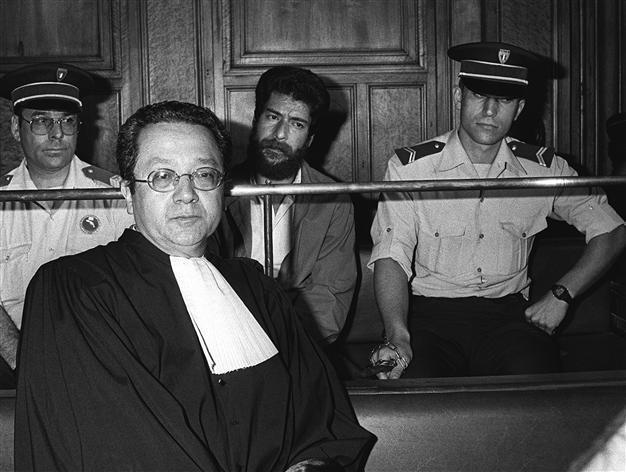France's 'Devil's advocate' lawyer Verges dies at 88
PARIS - Agence France-Presse

This file picture taken on July 3, 1986 shows Lebanese Georges Ibrahim Abdallah (3rd L) during his trial at the courthouse of Lyon, with his lawyer Jacques Verges (front). AFP photo
Jacques Verges, the provocative French lawyer who earned the nickname “Devil’s advocate” by defending a series of high-profile criminals from Turkish mafia leader Alaattin Çakıcı to Carlos the Jackal, died in Paris on Aug. 15 aged 88.
Verges died of a heart attack around 8:00 p.m. in the house where 18th century enlightenment philosopher Voltaire once lived, an appropriate setting for an iconoclast who devoted his life to defending unpopular causes, according to his publishing house Pierre-Guillaume de Roux.
“The ideal place for the last theatrical act that was the death of this born actor who, like Voltaire, cultivated the art of permanent revolt and volte-face,” said the publisher in a statement.
Supported Algerian National FrontBorn in Thailand in 1925 to a father from Reunion island and a Vietnamese mother, Verges was a communist as a student and later supported the Algerian National Liberation Front in its fight for independence from France. After securing the release of Algerian anti-colonialist militant Djamila Bouhired, he married her.
Çakıcı was defended by Verges when he was detained in France in 1998. Verges said in court that his client should not be sent back to Turkey, arguing that he was a political figure rather than a mafia leader.
One of his last high-profile cases was the defense in 2011 of his long-time friend, Cambodia’s former communist head of state Khieu Samphan, who faced charges of crimes against humanity over the 1975-1979 Khmer rule.
Then aged 86, the short, bespectacled Verges delivered a pithy riposte to prosecutors who had spent two days detailing the horror the country suffered under the Khmer Rouge regime, during which up to two million people died through starvation, torture and execution. The prosecution’s version of events “sounded like a novel written by Alexandre Dumas about what happened in Cambodia,” said Verges in a 10-minute speech, laced with a hint of irony and an occasional suppressed smirk.
Attacking prosecutors’ “fantastical view of reality,” he told the court: “Remember what monsieur de Talleyrand, Napoleon’s foreign minister, another bandit, said: ‘Everything that is excessive is vain’.” “Everything you said was excessive and therefore vain. May the tribunal remember that. I hope I haven’t wasted your time, thank you very much,” concluded Verges in a trademark summing-up. Verges’ life story reads like a novel, but there is one chapter that he prefers to leave unopened: from 1970 until 1978, when he left his wife and children and disappeared. He has referred to this period as “the dark side” of his life, leading to much speculation about these missing years. Among the more persistent theories are suggestions that he fostered ties with Palestinian militants or that he passed through Congo.
Verges himself said he “passed through to the other side of the mirror.” “It’s highly amusing that no one, in our modern police state, can figure out where I was for almost 10 years,” he told German newsweekly Spiegel in a 2008 interview.
On his return, he became the champion of extremists from both left and right. Most of his clients lost their cases but Verges’ flair was in courtroom provocation, attacking the prosecution and maximizing the publicity of his defendants’ cause.
